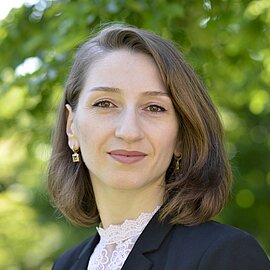The conference, which took place on 13-15 September 2017 at the Technical University of Munich in Freising-Weihenstephan, Germany, was held under the motto "Bridging the Gap between Resource Efficiency and Society’s Expectations in the Agricultural and Food Economy". Franziska Appel presented her work on how the behavior of farmers influences the resilience of agricultural structures. For her study, which is based on agent-based participatory experiments, she was awarded a GEWISOLA Best Paper Award. Dr. Linde Götz and Dr. Tinoush Jamali Jaghdani also received a Best Paper Award for their research on "Russia’s Agricultural Import Substitution Policy: Price Volatility Effects on the Pork Supply Chain". IAMO PhD student Miranda Svanidze, who is supervised by Dr. Linde Götz, received an award for the best presentation. She presented her work on the subject "How Well is the Russian Wheat Market Functioning? A Comparison with the Corn Market in the USA".
More information on the awarded papers and presentation.
GEWISOLA Best Paper Award
Wie beeinflusst das Verhalten von Landwirten die Resilienz von Agrarstrukturen - Eine Analyse agentenbasierter partizipativer Experimente
Franziska Appel
Das agentenbasierte Modell AgriPoliS wurde entwickelt, um den Strukturwandel von Agrarregionen zu simulieren. Um die Verhaltensannahmen der Agenten zu validieren, wurden partizipative agenten-basierte Experimente mit einer Modellerweiterung namens FarmAgriPoliS durchgeführt, bei denen jeweils ein Mensch einen der Computeragenten ersetzt. Mit Hilfe dieser Experimente zeigen wir, dass es einen systematischen Unterschied im Verhalten zwischen den ExperimentteilnehmerInnen und den Agenten gibt. Mit Hilfe einer Clusteranalyse lassen sich zudem innerhalb der Teilnehmenden verschiedene Verhaltensmuster identifizieren. Obwohl die menschlichen TeilnehmerInnen im Durchschnitt nicht unbedingt erfolgreicher waren als die Computer-Agenten, konnten wir ein resilienteres Verhalten nachweisen.
GEWISOLA Best Paper Award
Russia’s Agricultural Import Substitution Policy: Price Volatility Effects on the Pork Supply Chain
Dr. Linde Götz and Dr. Tinoush Jamali Jaghdani
The pork sector has been at the centre of Russia’s agricultural import substitution policy which was initiated in 2004 with the introduction of a pork import tax. In the aftermath of Russia’s WTO access in 2012, the Russian government restricted pork imports rather by non-tariff barriers, especially the food import ban, which was implemented in August 2014 within the Ukrainian crisis. Russia’s domestic pork production has shown a very dynamic development quickly reaching the government’s aim to increase self-sufficiency to 85%. However, results of the DCC-MGARCH model suggest that domestic pork price volatility has increased with the disintegration of the Russian pork market from international markets, and escalated during the food import ban. The analysis of volatility correlations shows that the volatility of external factors as the exchange rate, the pork import price and the share of pork imports from Brazil in Russia’s total pork imports have not increased pork price volatility in Russia. Rather, results suggest that pork price volatility is driven by domestic factors. We explain the raising price volatility with the segregation of Russia‘s pork market, which has decreased the elasticity of the domestic pork supply, and thus increases price effects of local supply shocks.
You can download the paper here.
GEWISOA Best Presentation Award
How Well is the Russian Wheat Market Functioning? A Comparison with the Corn Market in the USA
Miranda Svanidze, (Dr. Linde Götz)
This study investigates how well the Russian grain market is functioning and compares it to the USA. Wheat production in Russia is spatially spread across a large area. Production regions nearby Black Sea ports focus on wheat export, whereas other regions far away from the seaports trade wheat mainly domestically. Combining price transmission analysis with a structural model we find that distance reduces co-movement of grain prices between different regions in Russia twice as much compared to the USA. Further, results indicate that the wheat export region of Russia is only loosely integrated with other production regions. This is in contrast to the USA where grain prices in the export-oriented regions strongly influence price discovery in other domestic markets in the USA. The efficiency of the wheat market in Russia could be improved by investing in grain trade infrastructure, especially train transport. Also, market transparency should be enhanced by increasing the availability of information on regional wheat prices.
You can download the paper here.




